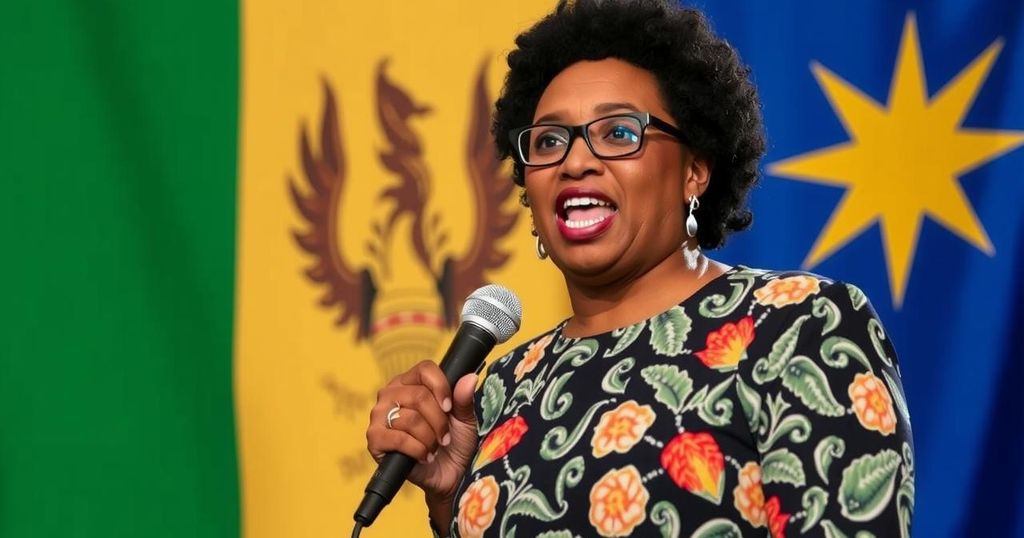Politics
AFRICA, BOTSWANA, DEMOCRACY, ELECTIONS, ELECTORAL COMMISSION OF NAMIBIA, EUROPE, GERMANY, GOVERNANCE, GOVERNMENT, HA, INDEPENDENCE MOVEMENT, INDEPENDENT PATRIOTS FOR CHANGE, NAMIBIA, NANDI - NDAITWAH, NET, PAN, PANDULENI ITULA, PARLIAMENTARY SEATS, POLITICAL DYNASTY, SOUTH AFRICA, SWAPO, VP, WINDHOEK
Isaac Bennett
0 Comments
Namibia Elects First Female Leader Amid Election Controversies
Namibia has elected its first female president, Vice President Netumbo Nandi-Ndaitwah, who won 57% of the vote amidst opposition claims of election irregularities. SWAPO continues to dominate the political landscape, retaining its parliamentary majority. Opposition parties plan to legally challenge the election results due to reported technical issues that allegedly hindered voter participation.
Namibia has made history by electing its first female president, Vice President Netumbo Nandi-Ndaitwah, who was declared the winner of the presidential election held last week. Nandi-Ndaitwah secured victory with 57% of the votes, overcoming expectations of a potential runoff. The ruling SWAPO party has maintained its dominance for 34 years since the nation gained independence from apartheid South Africa in 1990. Despite concerns over voting irregularities that led to a three-day extension of the election process, SWAPO has successfully retained a parliamentary majority.
Criticism arose from opposition parties regarding the election’s conduct, citing significant technical issues such as ballot shortages that allegedly disenfranchised many voters. The Independent Patriots for Change, led by Panduleni Itula, expressed their intent to legally contest the election results, which they called unconstitutional. Nandi-Ndaitwah’s political career is marked by her emergence from Namibia’s liberation struggle and her recent appointment as Vice President following the passing of President Hage Geingob. As the fifth president of Namibia post-independence, she emphasizes the importance of hard work in her administration.
In summary, while Namibia celebrates its first female leader, the election results prompt considerable debate about electoral integrity, reflecting a broader dialogue about governance and democratic practices in the region. The coming days will undoubtedly reveal how the opposition’s legal challenges unfold, as both parties continue to engage politically amidst scrutiny over the electoral process with SWAPO’s position unyielded in the face of criticism.
The recent presidential election in Namibia marks a significant turning point in the country’s political landscape, as Netumbo Nandi-Ndaitwah becomes the first woman to hold the presidential office. Since Namibia’s independence in 1990, the SWAPO party has dominated the political scene, and this election reinforces its continued supremacy despite growing opposition sentiments. With a sparse population and a legacy of stability, Namibia operates as one of the more democratic regions in Africa, yet the challenges regarding electoral fairness persist and are critical to the nation’s future governance.
In conclusion, the election of Netumbo Nandi-Ndaitwah as Namibia’s first female president signifies a historic achievement and an important milestone for gender representation in leadership. However, the allegations of irregularities and opposition challenges to the electoral process highlight underlying tensions within the democratic framework. How these issues are addressed will be crucial in shaping Namibia’s political trajectory and maintaining public confidence in its democratic institutions.
Original Source: abcnews.go.com




Post Comment